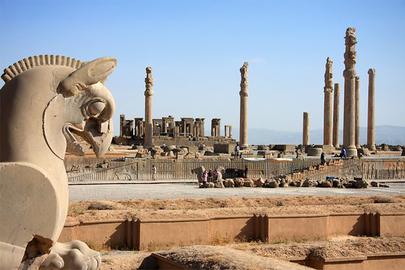June 18th marks the 36th anniversary of the execution of Mona Mahmoudinejad, a 17-year-old Baha’i woman, and nine other Baha’i women in Iran. Mona had been arrested by the Islamic Republic’s Revolutionary Guards for holding classes for Baha’i children. More than 200 Baha’is were executed by the Iranian authorities in the years after the 1979 Islamic Revolution. Mona’s death attracted worldwide sympathy and condemnation – helping to bring the killings to an end.
On Saturday, June 18, 1983, an hour after the weekly women's visitation at Adel Abad Prison in Shiraz, Mona Mahmoudinejad and nine other Baha'i women were transferred from prison cells to the Abdullah Mesgar Base (Chougan Square), and hanged in front of each other.
Prior to execution, each of these women was asked to turn away from the Baha'i faith and become a Muslim to save her life and escape the noose, but none of them agreed. All of them whispered prayers as they were hanged. The bodies of these women were buried without the knowledge of their families or religious ceremonies in the Shiraz Baha'i cemetery, Golestan Javid.
The executed were:
Ezzat Janami (Eshraghi), 57, along with her daughter Roya, two days after the execution of her husband, Enayatullah Eshrag;hi
Nusrat Ghofrani (Yaldaei), 56. Her son, Bahram Yaldaie, was executed two days earlier;
Tahereh Arjomandi (Siyavashi), 32. Her husband, Jamshid Siavashi, was executed two days earlier;
Zarrin Moghimi Abyaneh, 29 years old;
Mahshid Niroumand, 28 years old;
Simin Saberi, 24 years old;
Akhtar Sabet, 21 years old;
Shirin (Shahin) Dalvand, 25 years old;
Roya Eshraghi, 23, was executed with her mother;
Mona Mahmoudinejad, 17. Her father, Yadollah Mahmoudinejad, was executed three months prior
Mona and her father were arrested at their residence on October 23, 1982, by order of the Revolutionary Prosecutor, and sent to an Islamic Revolutionary Guard Corps (IRGC) Prison.
On that day, 45 other Baha'i citizens were also detained in Shiraz. At the time of her arrest, Mona was a 16-year-old adolescent with a youthful passion and joy, and full of hope to achieve grand aspirations in the future.
At first, it was thought that Mona would be released soon, because the only crime she had committed according to Shiraz Revolutionary Court officials was teaching the principles and rules of the Baha'i faith to several children of the same faith. However, after a short time, it became apparent that her charges, and the charges of the other detainees, were ideological, and that their crime was following the Baha'i faith. They were told that if any of the Baha'is were to turn away and become Muslim, they would immediately be vindicated and be released.
In its 782nd issue published on February 22, 1983, Khabar-e Jonoub newspaper featured an interview with Hojatoleslam Ghaza'i, a sharia judge and the head of the Shiraz Revolutionary Court. His response clearly shows that the arrest and execution of Baha'is in Shiraz was solely due to their religious beliefs.
He said: "In response to this question, I must say that, in the hope of the great God, the Muslim nation of Iran ... cannot tolerate the deviant Baha'is and toys of Satan, demons, or citizens of the superpowers and their agents. It is clear that in the Islamic Republic of Iran there is not the least place for Baha'ism and Baha'is. They say that we did not participate in any of the marches against the tyrant (the shah), that we did not participate in any of the Islamic Republic's polls and the Assembly of Experts and... because these actions are part of politics and we are religiously precluded from interference in politics. I remind them ... that before it is not too late, to recant from Baha'ism, which is rationally and logically condemned. Otherwise it will not be long before the day when the Iranian nation will act on its religious duty with respect to the Baha'is.... The Baha'is know that they are not stronger than the Separatists, and the people of Hezbollah will not be incapable of eradicating them.”
Mona first was imprisoned in the Central Guards Corps without being allowed to contact her family, until her mother eventually met with her on November 20. After a few weeks, Mona was transferred from the Revolutionary Guards to Adel Abad prison in Shiraz. In this prison, Baha'is suffered the most severe torture to make them deny their faith.
Habibullah Hakimi, one of the Baha'i prisoners, wrote in his memoirs: "They lay the prisoner on the bed, they cuffed their wrists and feet to the bed, cuffed the two toes, and they flogged the bottom of the feet. .. The thugs, who were all called Abdullah, had to finish their job quickly, and with the same bedraggled whip they went to another, causing severe injuries and many complications.”
He went on to say that interrogations were carried out with intimidation and coercion to force the accused to say they had relations with Israel: "If one of the defendants were to present proof and reason, and state the truth, they would be sent to the punishment room, and they were brutally abused with a cable or a whip.”
Since Baha'is were considered unclean, they were held in cells separate from other prisoners. As Hakimi explains, "When the Guards blindfolded the Baha'i prisoners and wanted to take them to interrogations, the Guards handed over a rolled newspaper to the detainee, and they would hold the other end of the paper so that they would not become impure because they had touched the detainee. Baha'i prisoners even had special plates.”
According to Soheila Vahdati, "In the ward at Adel Abad prison in Shiraz, in each women’s cell, there were three people together who had the right to go to each other's cells. However, hygiene was tough and they did not have regular access to the shower.”
There is no information available on the trial of Mona Mahmoudinejad. The book Story of Olia quotes one of Mona’s cellmates, who said the release of the 16-year-old girl was issued twice at a bail of 500,000 romans [about $50,000 at the time], but when her mother went to the prosecutor's office to pay, she too was arrested on charges of "membership to a Baha'i organization" and imprisoned for five months.
A report from the Baha'i International Community (BIC) states that during lengthy and abusive interrogations, Mona and nine other Baha'i women were given a chance four times to denounce the Baha'i faith and seek refuge in Islam. The fourth time, when none of them agreed to sign the statements authorities prepared for them confirming their willingness to deny their faith, the Shiraz sharia judge issued the death sentence for them on charges of "spying for Israel.”
The 10 women were hanged on Chougan Square on Saturday, June 18, 1983. According to an informed source, Mona Mahmoudinejad was the last person to be executed because of her young age, and so that she might deny her beliefs after witnessing the hanging of the nine other women. When her turn came, she was given her last chance to turn away from her faith. When she refused to do so, she was hanged as well.
Read more about the Baha'is on the Iran Press Watch site
visit the accountability section
In this section of Iran Wire, you can contact the officials and launch your campaign for various problems

























comments